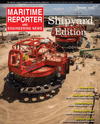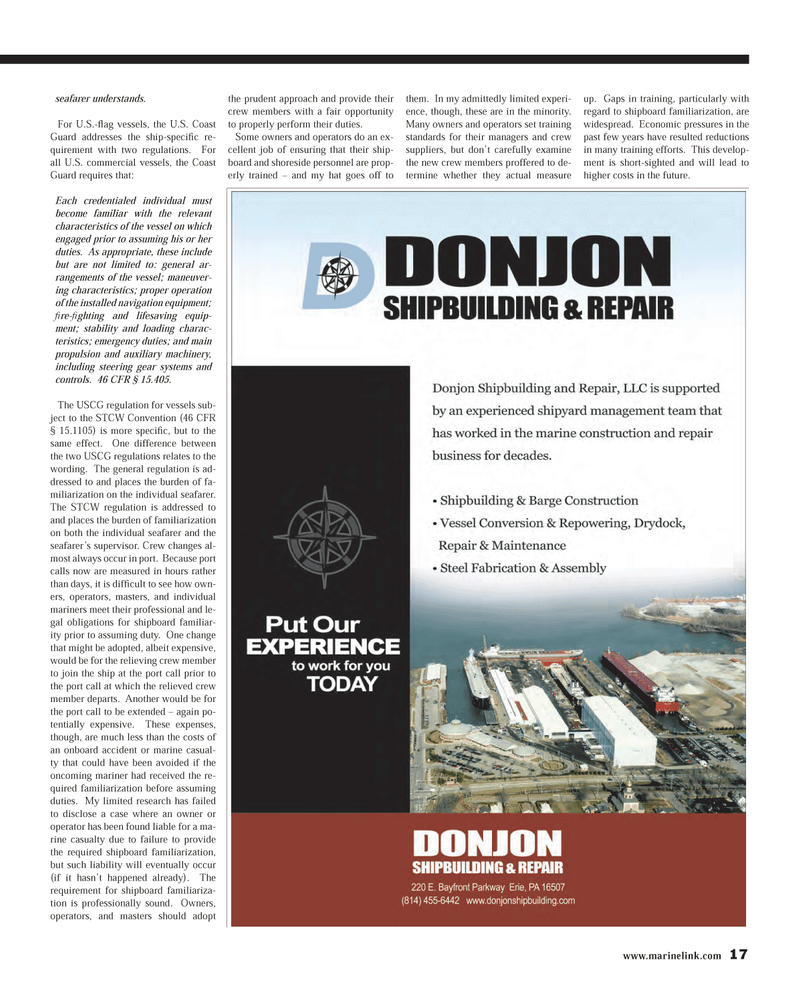
Page 17: of Maritime Reporter Magazine (August 2013)
Shipyard Edition
Read this page in Pdf, Flash or Html5 edition of August 2013 Maritime Reporter Magazine
seafarer understands. For U.S.-ß ag vessels, the U.S. Coast Guard addresses the ship-speciÞ c re- quirement with two regulations. For all U.S. commercial vessels, the Coast Guard requires that:Each credentialed individual must become familiar with the relevant characteristics of the vessel on which engaged prior to assuming his or her duties. As appropriate, these include but are not limited to: general ar- rangements of the vessel; maneuver- ing characteristics; proper operation of the installed navigation equipment; Þ re- Þ ghting and lifesaving equip- ment; stability and loading charac-teristics; emergency duties; and main propulsion and auxiliary machinery, including steering gear systems and controls. 46 CFR § 15.405. The USCG regulation for vessels sub-ject to the STCW Convention (46 CFR § 15.1105) is more speci Þ c, but to the same effect. One difference between the two USCG regulations relates to the wording. The general regulation is ad- dressed to and places the burden of fa-miliarization on the individual seafarer. The STCW regulation is addressed to and places the burden of familiarization on both the individual seafarer and the seafarer?s supervisor. Crew changes al- most always occur in port. Because port calls now are measured in hours rather than days, it is difÞ cult to see how own- ers, operators, masters, and individual mariners meet their professional and le-gal obligations for shipboard familiar- ity prior to assuming duty. One change that might be adopted, albeit expensive, would be for the relieving crew member to join the ship at the port call prior to the port call at which the relieved crew member departs. Another would be for the port call to be extended ? again po-tentially expensive. These expenses, though, are much less than the costs of an onboard accident or marine casual-ty that could have been avoided if the oncoming mariner had received the re-quired familiarization before assuming duties. My limited research has failed to disclose a case where an owner or operator has been found liable for a ma-rine casualty due to failure to provide the required shipboard familiarization, but such liability will eventually occur (if it hasn?t happened already). The requirement for shipboard familiariza-tion is professionally sound. Owners, operators, and masters should adopt the prudent approach and provide their crew members with a fair opportunity to properly perform their duties.Some owners and operators do an ex-cellent job of ensuring that their ship-board and shoreside personnel are prop-erly trained ? and my hat goes off to them. In my admittedly limited experi-ence, though, these are in the minority. Many owners and operators set training standards for their managers and crew suppliers, but don?t carefully examine the new crew members proffered to de- termine whether they actual measure up. Gaps in training, particularly with regard to shipboard familiarization, are widespread. Economic pressures in the past few years have resulted reductions in many training efforts. This develop- ment is short-sighted and will lead to higher costs in the future.www.marinelink.com 17MR #8 (10-17).indd 17MR #8 (10-17).indd 178/1/2013 12:12:43 PM8/1/2013 12:12:43 PM

 16
16

 18
18
